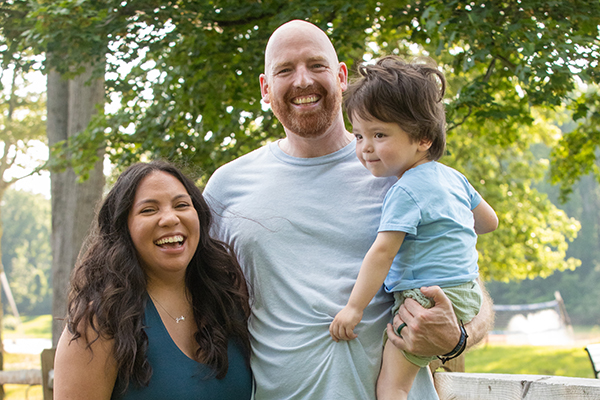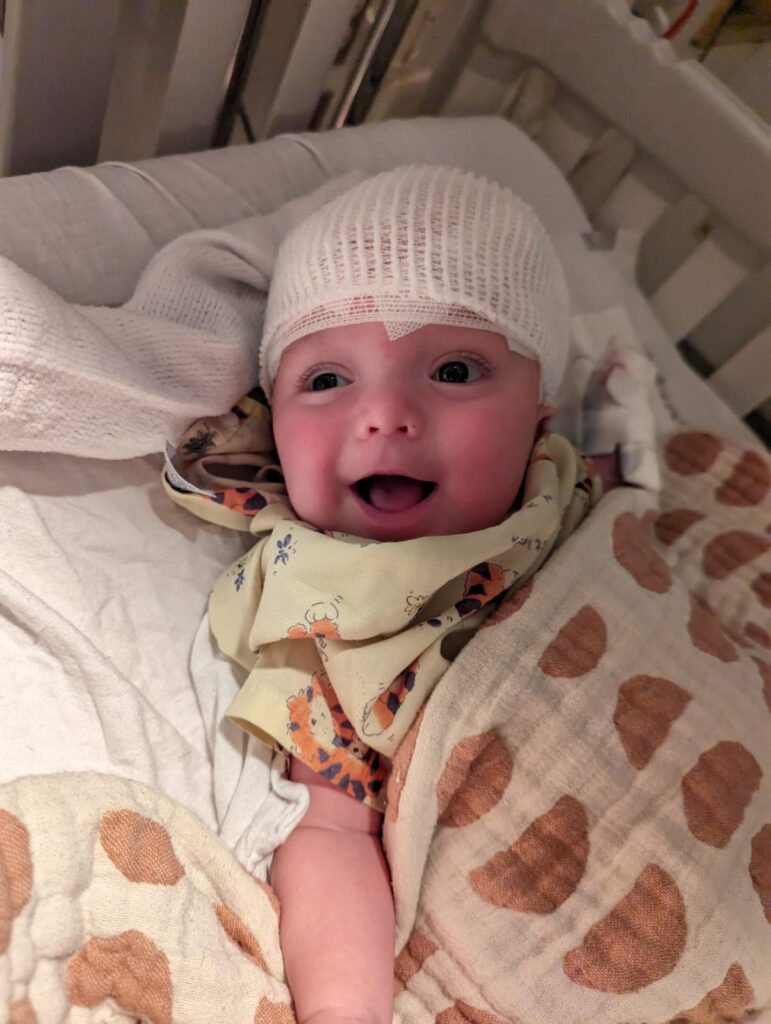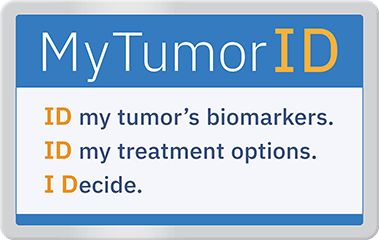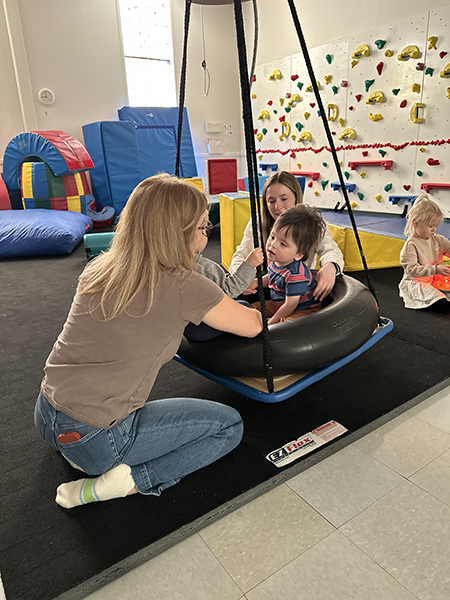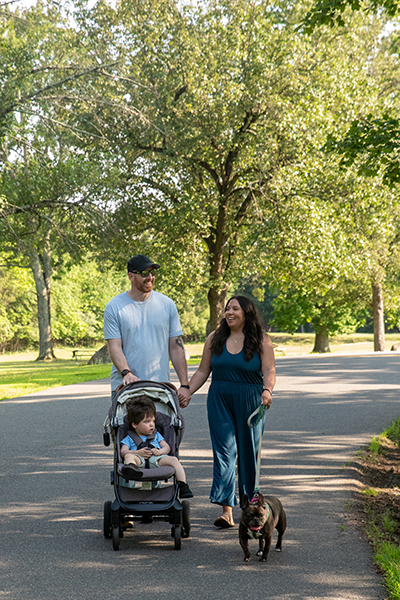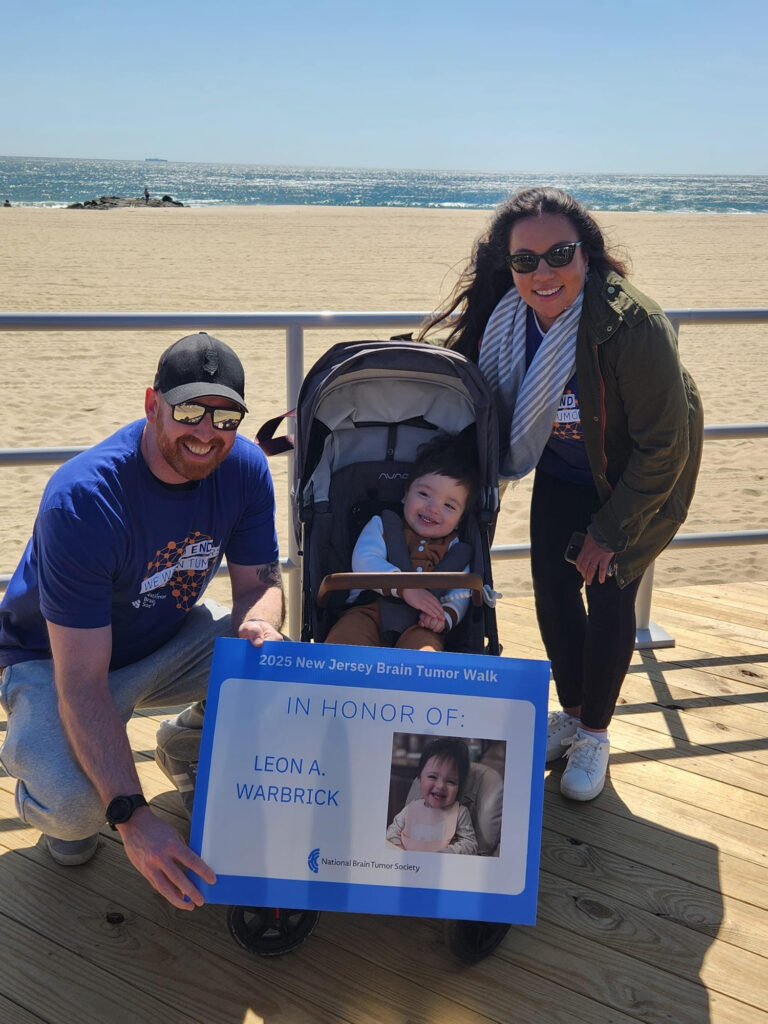At two years old, Leon is a bright light in his parents’ lives. Gabrielle and David describe him as a little boy who is always smiling, laughing, and delighting in small joys. Despite the challenges he faces each day, it takes a lot to make him cry or get upset.
Most of Leon’s days are filled with therapies — physical, occupational, speech, and developmental. Yet, when they do get to spend family moments together, his parents cherish simple things like going for a walk or spending time with Leon’s cousins.
Even Leon’s interactions with the family dog Brisket are memorable. “He tries to be overly affectionate with her,” David laughed. “He just grabs at her, so she’s learning to stay away from him.”
These lighthearted moments are hard-won after Leon’s unexpected brain tumor diagnosis.
A Routine Checkup
Leon was only four months old when his parents noticed his head was growing rapidly in size.
“It kind of caught us off guard,” David recalled. “We definitely noticed his head growing, but there was nothing besides that to indicate something was wrong.”
Leon’s pediatrician acted quickly, ordering imaging and connecting them with a highly regarded neurosurgeon.
“We had imaging done on a Tuesday, and then we were in operation, you know, pre-op the next day,” Gabrielle said. “It was really quick, really sudden. His frontal lobe was overdeveloped — the best way I can describe it is he looked like a beluga whale.”
Leon had been born two months premature, so his parents had only been home with him for about six weeks before they were suddenly thrust back into the hospital environment.
No Time to Think, Only to Act
From the moment they entered the hospital, Gabrielle and David felt swept along in a whirlwind of urgent medical decisions. “We didn’t really get a second to think about it,” Gabrielle said. “It was all go, go, go.”
Leon endured blood transfusions, blown veins, swelling, and long hours of instability post-op, along with two additional surgeries for shunt placement.
“He was in the hospital for about 10 to 12 days, almost two weeks in ICU care,” Gabrielle said. “Even the nurses told us his case was one of the top three that traumatized them as a team. When they told us about it, and we read the discharge notes, we were just like, holy crap.”
The trauma of so much hospital time weighed heavily on them, but their neurosurgeon helped provide direction in the midst of chaos. “We say that he was like our guardian angel,” Gabrielle said. “He makes every patient feel super special and cared for.”
Biomarker Testing Altered Leon’s Diagnosis
After surgery, doctors told the couple that the tumor looked benign, and they suspected it was a rare brain tumor called pleomorphic xanthoastrocytoma (PXA). The neurosurgeon wanted to make sure the diagnosis was accurate, so he sent the tumor tissue off for biomarker testing to get a full panel of information about Leon’s tumor.
Leon’s doctor explained it to Gabrielle and David as: “It’s got a trunk. It’s got big ears. It lives in Africa. I think it’s an elephant, but we have to wait until we get the testing back to know for sure that it’s an elephant.”
Unfortunately, the biomarker testing results indicated Leon’s tumor was actually a more aggressive form of malignant brain tumor three weeks later.
“We knew the minute they called to say Leon had to meet with a hematologist and neuro-oncologist out of NYU, that this is no bueno,” Gabrielle said. “When we went to the appointment, we learned the results showed the tumor was actually a high-grade astrocytoma.”
That experience underscored for Gabrielle and David just how essential biomarker testing is in understanding the true nature of a brain tumor. It was only through this analysis of the molecular and genetic profile of Leon’s tumor that doctors realized it was not what they first suspected.
Stories like Leon’s are why the National Brain Tumor Society launched the MyTumorID campaign to educate patients and caregivers about the importance of biomarker testing to accurately identify one’s tumor to then make informed treatment decisions.
Choosing a Treatment Path
When the biomarker testing assessed Leon’s tumor type, doctors presented three treatment options: do nothing, start chemotherapy, or try a new targeted therapy.
Gabrielle and David were physically and emotionally exhausted from all the hospital trips between the NICU at birth and later the PICU after surgery.
“We were just mentally tapped out,” David said. “The idea of daily chemotherapy treatments felt impossible. Even just going back to the hospital now and hearing the beeps and all that stuff, it’s traumatic.”
Instead, they chose the third option: an oral targeted therapy known as larotrectinib (Vitrakvi), which works against tumors with a specific genetic mutation known as an NTRK gene fusion. The biomarker testing results showed that Leon’s tumor had this specific mutation, so he would qualify for this treatment that targets this specific gene fusion.
Gabrielle explained that the doctor who had worked on the original clinical trials for this treatment in Boston had transferred to NYU Langone, where Leon was being treated.
“She was really an advocate for it,” Gabrielle said. “She told us, ‘I did the original trials.’”
Compared to chemotherapy, which would require many hospital visits, Leon was able to take this liquid medication at home.
“Thank God that there’s this drug out there that specifically targets this mutation,” David said. “It’s wild that there’s such a medication sitting in our fridge next to the celery and sour cream.”
Given that this medication was only FDA approved in 2018, long-term data didn’t yet exist at the time. At first, they were told Leon might only need to be on the medication for two years, but newer data suggest he may need to remain on it for life.
Daily Life Today
With larotrectinib keeping Leon’s tumor stable, life revolves around therapy schedules and medical check-ins. Every three months, Leon has bloodwork to monitor his liver function and gets an MRI. Fortunately, he hasn’t experienced side effects from the treatment, but he does take antiseizure medication, and the daily grind of therapy is demanding.
“Mondays and Wednesdays, we take him to inpatient PT, OT, and speech,” David said. “We have a mix of early intervention on Tuesdays and Thursdays — two PT sessions, two OT sessions, speech therapy, and developmental intervention. On Fridays, he does constraint therapy, where they put his strong hand in a cast to force him to use his weaker side.”
Gabrielle manages most of the transportation to and from his 10-15 weekly appointments after being laid off from her job the same week they received Leon’s diagnosis — a twist they now call “a blessing in disguise.” David had great parental leave as a police officer, so he was able to be out of work and support Leon for six months.
Their days are structured around Leon’s therapies, but they also hold space for laughter and family time.
The Weight of Caregiving
The transition from parents to caregivers came suddenly.
“We made it our motto just to trust and have faith in these people and their education,” David said. “There’s no way we can read up on all this information. We just have to trust they’re guiding us in the right direction.”
But the weight of caregiving is heavy. For David, the hardest part has been uncertainty. “Not knowing what he’s going to be like in five years or 10 years,” David said. “Am I ever going to play catch with him? The unknown of the future was my biggest stressor.”
For Gabrielle, the greatest challenge was learning to accept help. “We were very adamant that we were going to try to do this on our own, not burden our families,” she said. “And then after everything that happened, we now take all the help.”
Both parents have leaned on therapy and self-care to help manage their mental health. Gabrielle turns to yoga and reading when she can, while David finds strength in focusing only on the present.
“My therapist got me to look at just today, just tomorrow — one day at a time,” David said. “I really have shortened my time frame on my worries, so that definitely helped me.”
One piece of advice that resonated deeply came from a therapist: “Make sure when you’re home together as a family, you take time to just be parents, not therapists or caregivers.”
Loneliness and Community
Despite strong support from immediate family, Gabrielle and David admit that the journey often feels isolating.
“They all definitely reach out, but at the same time, it’s really lonely because they can’t relate to what we’re going through,” David said.
Friends, too, sometimes don’t know what to say. “I just wish people weren’t afraid to have that conversation about Leon,” he added. “A lot of people clam up.” Gabrielle agreed, saying the lack of genuine engagement after his diagnosis can feel like they’re being ghosted.
They’ve learned what kinds of responses are unhelpful, such as comparisons to other people’s cancer experiences, and what feels supportive.
“I wish people would just ask with genuine concern, like, ‘How are you doing?’” Gabrielle said. “It kind of catches me off guard when people ask me that, because I don’t get that question enough.”
New Jersey Brain Tumor Walk
Finding support outside of their family has been crucial. Gabrielle discovered the National Brain Tumor Society through a Google search, and the family signed up for the New Jersey Brain Tumor Walk.
“We wanted to give back because we felt like we got so lucky that this research had been done prior to us,” David said. “Just being surrounded by people going through the same stuff who actually understand what we’re going through was really comforting.”
The next year, they returned with a larger group of friends and family, calling themselves Leon’s Lions.
For Gabrielle, the goal of fundraising for NBTS is so that “other people can be as fortunate as we were to catch it early and then have this new medication on the market. We want to fund more top-tier research that can lead to newer studies in younger patients and newer medications. I like that NBTS has a specific targeted approach to brain tumors.”
Looking Ahead
The uncertainty about the future remains, but Gabrielle and David are learning to focus on what they can control. They take joy in small moments, lean on each other, and fight for Leon’s best possible outcome.
Above all, they want others to know that families like theirs need compassion, understanding, and community. “It already feels lonely enough,” David said. “So don’t clam up. Don’t be afraid to ask questions.”



